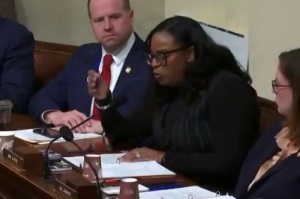Professor removed from department chair position for stressing importance of biological sex

A feminist University of Alberta professor of anthropology has been removed from her associate department chair position for expressing the reality and importance of biological sex — comments deemed "unsafe."
Kathleen Lowrey, an associate professor of anthropology at the university was asked to resign from her position as an associate department chair for undergraduate programs after students complained that she had voiced what is known as "gender-critical" views, and they felt "unsafe." According to the Canadian Ryerson University-based Centre for Free Expression, that Lowery has been open with her perspective is precisely the problem.
"Should a course have gender or sex as a central theme, on day 1 she offers a summary of her views along with the declaration that no student need agree with her about any of it, as she did this year with her course 'Anthropology of Women.'...Lowrey also posts statements related to her views on her office door — something she is entitled to do. She contends that in asking her to resign from her service role the University is endorsing ideological conformity," the organization explained in a Tuesday blog post.
When the professor declined to resign from her associate chair role, she asked that the reasons for dismissal be documented formally, making clear why she was being asked to step down. In the letter she received, no specifics were given, stating only that "it is not in the best interests of the students or the University” that she continues in that role.
"At its most alarming, the University of Alberta’s position appears to be that where students have a 'perception' that an idea or a set of ideas harms them, it does not matter what the precise complaints are in regard to the person holding the ideas (or indeed whether there is any precise complaint). Lowrey has been expressly told that it doesn’t matter if any of the claims students are making about her are true," CFE explained.
Reached by phone Friday, Lowrey told The Christian Post that she is exploring her options with her faculty association to contest the move.
When she requested a detailed letter from the dean documenting why she was being dismissed, she was brushed off.
"Institutional memory lives on paper," Lowrey said.
"Five years from now, if you look at this letter and it doesn't say [the reason for dismissal] so it could have been that I was coming into work drunk every day. It could be that I was stealing all the office supplies. It could be anything. I said: 'Could you specify?'" she said, explaining her request for a detailed list of reasons as to why she was dismissed.
But she knew why they were dismissing her because she had conversations in which they told her that it was because of her views. The dean reportedly wrote back and said such a letter would not be productive. In Lowrey's view, the university's position, which she disagrees with, appears to be that unlike her teaching and research, a service role such as an associate chair of the department is not protected by academic freedom so the school will not be obligated to respond to a grievance of this kind.
The anthropology professor finds it worrisome that what happened to her might soon be applied to other employees, positing as an example someone in the registrar's office tweeting a quip about a news article on a "pregnant man," that such a joke could constitute a basis for termination should a student complain about "hate speech."
Asked why she believes this particular issue seems to be off-limits for critical discussion, Lowrey said that the way in which bill C-16 — which in 2016 added "gender identity or expression" as protected grounds in the Canadian Human Rights Act and Criminal Code — has been rolled out has significantly impacted how Canadians function.
"I don't think bill C-16 is a good law but whether you think it is a good law or not, like all laws, it comes down to how it gets implemented in policy. And people have been interpreting its implementation very, very broadly," she explained.
She pointed to the example of the 2005 murder of Nina Louise Courtepatte, a 13-year-old girl who was brutally raped and killed on an Edmonton-area golf course. The killer, Michael Williams, who bludgeoned Courtpatte to death with a hammer and then set her body on fire, now self-identifies as female and is currently housed in a women's prison. The Toronto Sun reported in February that Williams remains a fully-intact male and “only takes hormone replacement therapy drugs two weeks a month so he can maintain an erection.”
"I don't think that's a 'safe space' for female prisoners," she said, praising the work of activist Heather Mason, who has been advocating for the rights of incarcerated women.
"I don't see how, as a feminist, you can listen to Heather Mason speak and sleep at night, if you say, 'Nope, we shouldn't be having that conversation,' or that the only acceptable position is 'absolutely transwomen are women and anything else is hate speech.'"
She believes many of her students are simply not aware of the issues that transgender policies cause.
The phrase "gender-critical" is associated with the feminist contention that gender, as it is understood in contemporary discourse, is a set of sex-based stereotypes. Feminists of this stripe have long maintained that women, as a class, have been oppressed on the basis of their biological sex and that gender is a regressive, socially-constructed system that prioritizes men over women. Thus, they are "critical" of "gender."
Such perspectives have come into sharper focus with the ascendency of transgender politics in many Western nations. Around the world, transgender-identifying males who present as and claim to be women have been instrumental in revamping laws, public policies, and regulations by adding self-declared "gender identity" as a protected category, usually under the banner of civil rights. Those who espouse gender-critical views argue that "gender identity" undermines "sex" and that protecting both in law is impossible because gender identity is not rooted in material reality whereas sex is immutable.
The University of Alberta is not the only Canadian institution of higher education where critical discussion of transgenderism has elicited controversy.
In November 2017, then-graduate student Linsday Shepherd played for her communications class at Wilfred Laurier University in Waterloo, Ontario, two clips of a debate featuring the University of Toronto psychologist Jordan Peterson about bill C-16. She was soon thereafter summoned to an interrogation with her supervisor, the head of her graduate studies program and a university official from the diversity and equity office.
Shepherd secretly recorded the meeting, during which she was told she had created a toxic climate for some of the students by playing the debate footage during the class.



























